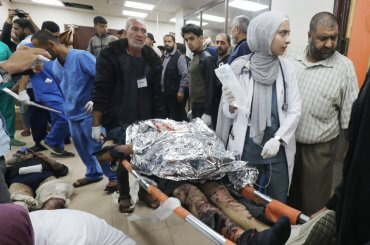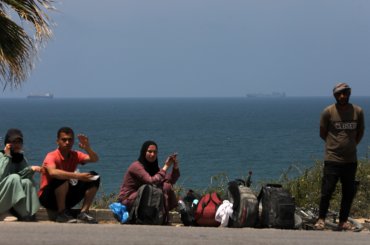A message from the family of Mohamed Bouazizi, the young Tunisian whose death catalyzed the Tunisian Uprising, for families in Libya who have lost loved ones during the recent protests.
Watching Qadhafi give his speech I’m relieved to see that somebody has more public relations problems than I do right now. Al Jazeera is juxtaposing his speech with footage of Libyan’s opposing him in Benghazi. This is similar to what Jazeera did in Egypt, when it went from Mubarak speaking to the reaction of Egyptians in Tahrir Square, or from Umar Suleiman speaking to those demonstrators.
Its hard to imagine the revolutions sweeping the Middle East happening without al Jazeera. Yes Tunisians started their revolution, taking the first steps, and it took Jazeera a couple of weeks before it focused on Tunisia. But once its started and Jazeera was on its war footing it could connect activists and demonstrators from around the country, it could disseminate information to other parts of country. Now middle class people in Tunisia who were told by their parents not to get involved in politics could learn about what was happening elsewhere and feel that somebody else was also expressing their grievances, or other grievances, and it was ok for them to express them too.
Once the revolution starts Jazeera shapes people’s political opinions and plans, it asks demonstrators and activists and leaders what they will do, will they form a political party, this is what one side says, what do you say in response, etc, thus shaping political dialogue and facilitating it. In Egypt, when established opposition parties and Muslim Brothers went to Umar Suleiman to cut a deal, Jazeera played a key role in scuttling this betrayal of the revolution by going back to the demonstrators and airing their demans and challenging the opposition leaders. Jazeera asked people what they wanted if Mubarak left, if they wanted Suleiman, etc and it pressured political leaders who were more inclined to compromise with the regime. Jazeera forced them to hear what the street was saying and prevented them from compromising.
Jazeera also gave a boost to protestors. When you go out on the streets you don’t know how people will respond but Jazeera brings public figures and politicians and intellectuals and asks them to respond to what you’re doing and they can then point to your demonstrations to back up their own positions on the regime.
Jazeera also helped save lives. If the message was not brought and pictures were not shown massacres would take place in the dark. It also forced international media and actors to act.
In Libya, as in Egypt, Jazeera has been naming names and shaping public opinion, challenging people. People who come on Jazeera are calling on people by name, Libyan guests are naming senior government people and military people, like regional commanders, asking why aren’t they moving in to Tripoli. Its not necessarily Jazeera naming these officials, but it gives others the chance and then it interviews Libyan officials to ask them what they think, and its talking to people who are in the country but so far no Libyan diplomat has come out in defense of the regime. Jazeera has spoken to major Libyan tribal leaders from tribes such a the Warfala, Zuweil, Tuareg, Tabu. A woman from Tripoli from the Warfala tribe was calling on people to come to their aid and she was calling on leadership of Warfala tribe and then a leader of the Warfala tribe and he responded to her, saying rest assured my sister we will come to your aid. Another tribal leader threatened to cut off oil. Thus Jazeera is uniting various factions and regions in the country, because Libyans are watching Jazeera like the rest of the Arab world.
In Egypt once cell phones and internet were shut off Jazeera announced where the next demonstrations would be. Jazeera was essential in bringing people out. Thanks to Jazeera you can hear the same chants shouted by demonstrators in Tunisia, Egypt, Algeria, Yemen, Bahrain and elsewhere.
If regimes could do whatever they want there would have been more massacres. In Egypt Jazeera had a live shot of Tahrir square, showing anything the regime might do to the demonstrators, and it was also highlighting the actual deaths happening, so the world came and said we have to do something.
In Libya they are calling on tribes asking them what are you going to do? The Warfala tribe took the city of Binwalid just south of Tripoli. They took it over not by attacking it, instead military leaders gave it to them. Jazeera’s pictures from Benghazi, showing the massacres and the bombings affect the way people are responding in the rest of the country and affect the decisions of soldiers told to shoot, including maybe those two pilots who defected to Malta just as Jazeera may have affected the decisions of Tunisian army. And in Egypt Jazeera showed an army officer joining the protestors and speaking to his fellow officers, generals and the chief of staff.
Egyptians learned from Tunisia to protest at night, it exhausts security forces. They learned to establish popular committees. Egyptian youth refused to have representatives because they saw how in Tunisia those representatives tried to cut a deal. They learned how to deal with teargas, so Egyptians washed their face with cocacola. Unfortunately regimes can also learn and in Yemen the dictatorship hastily let its hired supporters take over Sanaa’s Tahrir Square which is the only open square in the city, meaning the opposition lost a symbolic and strategic location.
Jazeera has been criticized for its weak coverage of Bahrain. It seems unlikely that there were orders from the top, even though the Qatari royal family, like the rest of the GCC stood by the Bahraini royal family. Al Jazeera English was very strong in its coverage and focused on the regime’s brutality. Jazeera Arabic has two modes, their normal mode and their war footing, known as “rolling,” which is its current Libya mode (and Egypt Tunisia, Gaza in the past). Its an all day focus on the subject and everything else happens between 4 am and 7 am. It took a few days before it shifted to this mode on Libya. Its not an editorial issue, they didn’t see it as a big story. To be on war footing you have to be sure the story will last. In Bahrain it did not last, only a handful of demonstrators were killed and it died down. It’s a big decision shifting to this mode. You have to predict how long it will last because you have to cancel various current affairs shows costing huge amounts of money and you have flown in guests for them. Its called rolling news when you don’t have news bulletins, just nonstop live coverage. Jazeera Arabic remains on this war footing, so breaking news has to be postponed or ignored. Jazeera Arabic is on the phone most of the day or it has guests. For Jazeera English it’s a very big decision to go rolling, you have to fly in presenters, producers and technical people, unlike Arabic, to shift the operation from 16 hours to 24 hours. In Tunisia they were late going rolling. You need a lot of pictures, a lot of videos so you can roll them all day. The pace of Jazeera Arabic is so intense when its on its war footing. Jazeera English takes time to brief presenters and tell them whats happening. In Arabic nobody knows what the presenter will say next and some of the presenters are so big and they have biases or feel confident that they feel like they can influence whats happening next, you can see them crying on the air, attacking somebody on air. Jazeera’s coverage of Iran has also been criticized. But Jazeera is strongest when it can talk to the people it is covering, when they are watching it and listening to it. Iranians are not watching al Jazeera. This is why its so exciting that there will soon be a Turkish al Jazeera and a Swahili al Jazeera.
Al Khanzeera
One sign of al Jazeera’s power is how much people hate it. In Lebanon I have heard many Sunnis (Future movement supporters of Hariri and backed by Saudi Arabia) call al Jazeera “al Khanzeera,” or ‘the pig.’ This is because it was perceived to be too close to Hizballah (and hence Shiites). And in Iraq during the first couple of years of the American occupation Shiites called it al Khanzeera because they perceived it to be pro Baathist and anti Shiite. Iraqi Shiites were later reconciled with Jazeera once it interviewed Muqtada al Sadr and it became more sympathetic to Shiites there. Its not that Jazeera is pro or anti Shiite or Sunni, but its pro resistance and pro nationalist.
Al Jazeera crews were attacked in Lebanon by Sunni mobs in January. In February al Jazeera crews were attacked by pro government thugs in Yemen, the cameraman was beaten, his camera broken, and thugs were looking for the al Jazeera reporter by name so they could lynch him. On the other hand I saw anti government demonstrators in the Yemeni capital of Sanaa thanking al Jazeera. The Saudis, former Egyptian regime, Qadhafi and many Arab dictators despise Jazeera as do those seen as collaborating with American hegemony or with Israel. Jazeera is the new Gamal Abdel Nasr, the nationalist force uniting the region.
Through Jazeera, the government of Qatar is effectively fomenting revolutions in much of the Arab world. And yesterday a leading Sunni cleric Sheikh Yusuf Qaradwi, who was exiled from Egypt and living in Qatar, issued a fatwa calling for Qadhafi to be killed, surely something unprecedented in the region’s history. The closest I can think of is when Seyid Hassan Nasrallah of Hizballah urged Egyptians to overthrow their government during Israel’s Gaza Massacre (in which the Mubarak regime collaborated).
Oh, and this just in, Jazeera Arabic’s correspondent in Yemen has received threats.
Oops, I was wrong, at 3 AM on February 23 al Jazeera remembered that stuff is happening in Yemen and some Yemeni demonstrators were shot. Whats happening in Bahrain? In Algeria, Egypt, Jordan, Palestine?
This post originally appeared on Rosen’s blog nirrosen.tumblr.com.

